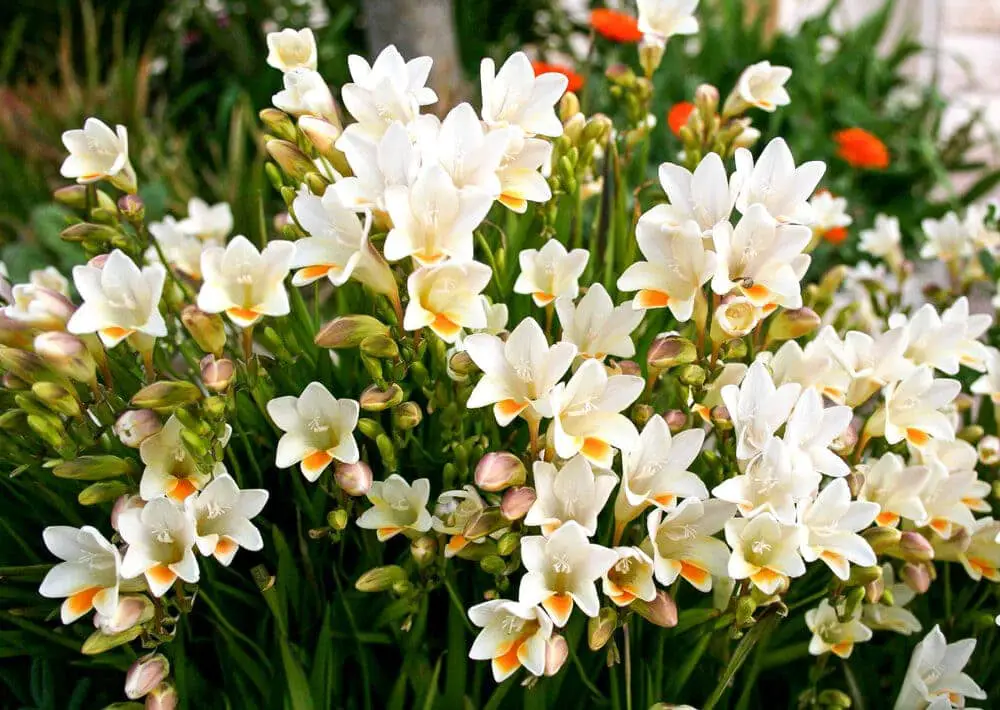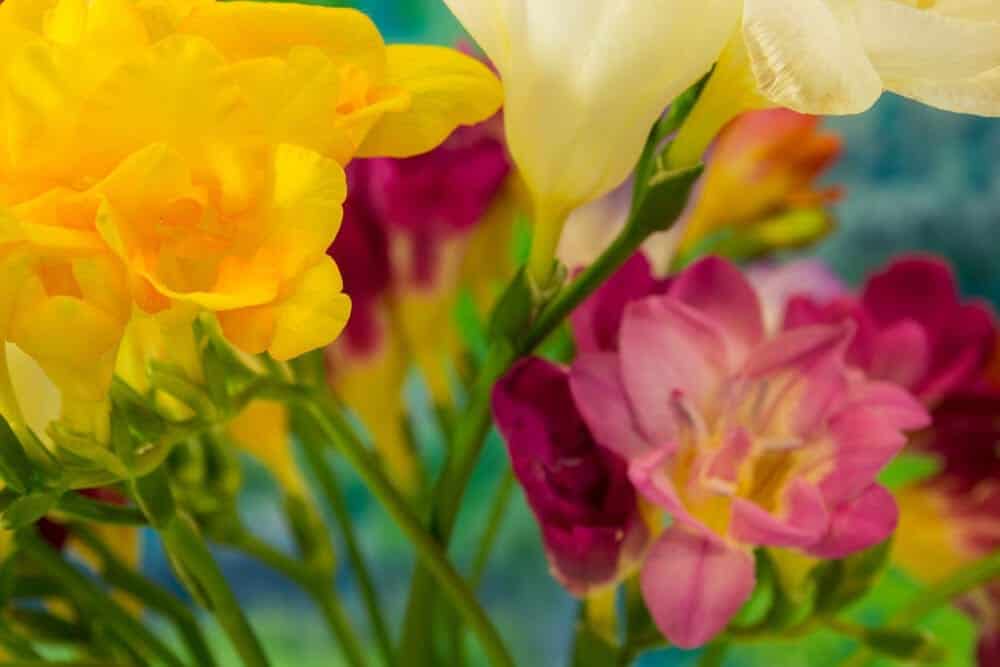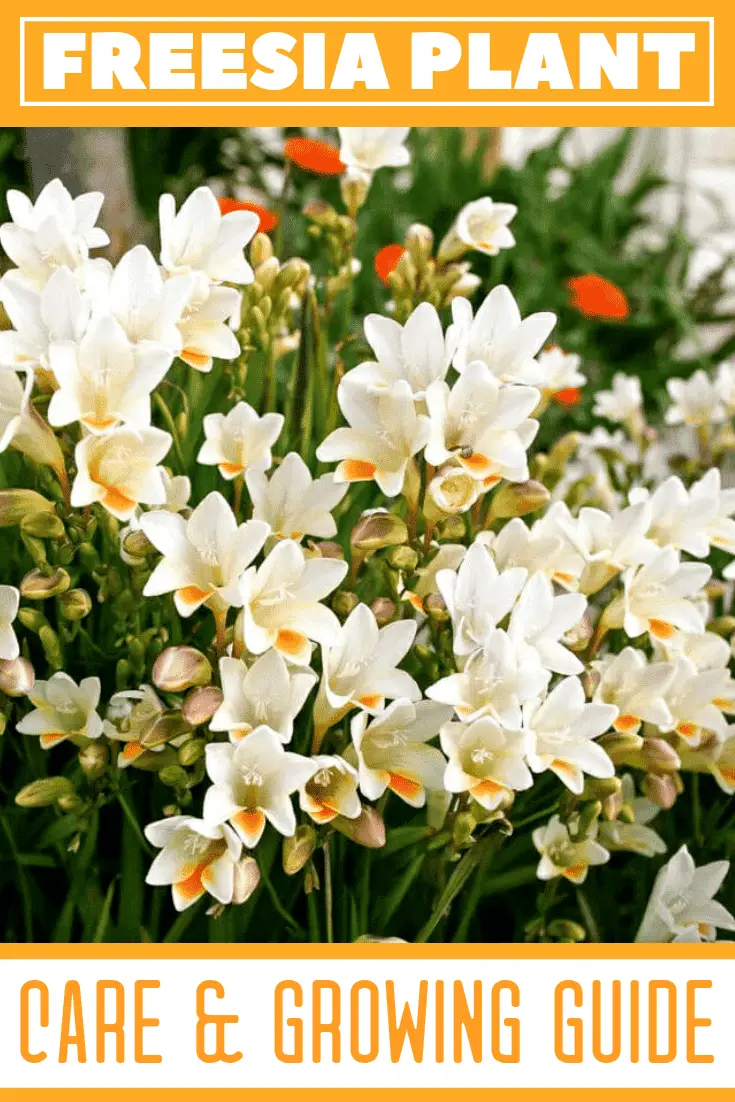The Freesia plant gives you bright flowers and is easy to care for. They will make a beautiful addition to your garden or home.
The Freesia plant is considered a zygomorphic plant, which means the flowers grow along just one side of the stem. This happens because, at the bottom of the flower, they turn at right angles so the upper part of the stem grows almost parallel with the ground.
The flowers face upwards and bloom along the top side of the stalk.
Freesia Plant Care & Growing Guide
1. Light Requirement
They are much happier in cooler temperatures but should be grown in full sun. If you live in an area where the summers are hot with short springtime, you should consider growing them in a planter indoors.
The Freesia plant does not grow well in cloudy, rainy areas or areas that are hot and humid. Although they like the sun, the Freesia plant should not receive direct hot, afternoon sun.
2. Water
The Freesia plant should be kept well watered but when the flowering stops, the soil should be allowed to dry out slowly. If you are planting a Freesia plant in a planter, you need to make sure that it has adequate drainage to prevent the soil from becoming waterlogged.
You should water your Freesia plant in the morning so it will have time to dry out by nighttime. During its growing period, you should water it once a week.
3. Climate
They should be planted in USDA Hardiness Zones 9-10
4. Soil
You should make sure that it is planted in well-drained soil that is fertile. When planting indoors or outdoors, make sure that the planting hole is prepared by using some coarse builder’s sand. It should be cultivated in peat moss compost, decomposed manure, or ground bark. When mixing your own soil, make sure that it is two parts compost to one part grit.
For Freesia plants indoors, you should feed them a soluble fertilizer weekly, but make sure it is half the recommended strength.
5. Temperature
The Freesia plant needs to be grown in an area where the day temperatures range from 55-70 degrees Fahrenheit and have a nighttime temperature between 40-55 degrees Fahrenheit. The Freesia plant cannot tolerate any frost so it will die if the temperature is below 25 degrees Fahrenheit.

6. Repotting
When repotting a Freesia plant, you want a pot that is at least three inches deep or three times the height of the bulb. The planter should have drainage holes in the bottom. Fill it loosely with a potting mix. You want to make sure that you keep the soil loose so that the roots can easily grow through the soil. Keep the potting soil barely moist until the new growth appears. You should make sure that you turn the pot every few days to ensure even growth.
7. Speed of Growth
When you grow your Freesia plant from seeds, it can take 8-12 months for them to bloom. When you start your plant indoors, it will take 25-30 days to germinate so you can plant them outdoors or in a planter at this time.
8. Height and Spread
The Freesia plant has two-inch flowers with 12 inch wiry, arching stems. This plant can reach a height of 12-18 inches and spread to 6-12 inches.
9. Flowers
The flowers are narrowly funnel-shaped with a fragrant sweet smell. They are a cream color with a gold throat but also have cultivars in pure white, gold, red, beige, pink, purple, and muti-colored. The flowers bloom in the fall in the Southern Hemisphere and in the Northern Hemisphere, they bloom in the spring. Once they start to bloom, they will continue to produce flowers for about 12 weeks.
10. Trimming
Before trimming the Freesia plant, wait until the foliage had naturally died back so the leaves and bulbs can capture and store energy for a new year’s regrowth.

Is Freesia Plant Poisonous?
Freesia plant is not toxic to humans but if you ingest large amounts of it, it can cause stomach discomfort or upset. It is is also non-toxic to your pets.
Can Freesia Plant grow in Water?
No, they cannot be grown in water. They have to be planted in soil in order to grow and blossom.
How to get Freesia Plant to Flower?
You need to follow the instructions for planting in order to get them to flower.
More like this: Teddy Bear Vine: Plant Care & Growing Guide
Common Freesia Plant Diseases
Freesia plant is prone to a variety of diseases, including:
- Root rot—this is caused by overwatering or letting it sit in waterlogged soil in a planter.
- Mold—this can happen if you leave water sitting around the plant at night. Prevent this by watering in the morning.
- Aphids—these can just be removed by hand. If you have them, you will notice the leave turning yellow.
- Leaf spot—on the leaves, you will see green or yellow spots so to prevent this, make sure that you have good drainage.
Learn more:
Conclusion
- The Freesia plant has a few small leaves on each stem with narrow, sword-shaped basal foliage.
- The bulbs of the Freesia plant should be planted three inches apart and two to three inches deep, pointed end facing up.
- Bulbs should be planted in early fall or late summer so they can get a good root system started and start blooming in early spring.
- In areas where they are hardy, you can leave the clumps undisturbed for three years before you need to divide the plants.
- In a colder climate, after the foliage has turned brown, dig up the corms and store in a dry, cool area until it is time to plant them in the spring.
- When planting them in a planter, plant the bulbs in the fall.
- In a planter, you should add a support stake to help avoid root damage
- Before planting your seeds, soak them for 24 hours in warm water.
- The Freesia plant does not bloom a second time indoors so each year you will have to replant them.

Victoria is the owner and main author of hobby plants. She loves spending her free time in her garden planting and taking care of her plants. Victoria hopes you enjoy the content here!
![Mother Of Thousands Plant [Complete Plant Care Guide] Mother Of Thousands Plant [Complete Plant Care Guide]](https://www.hobbyplants.com/wp-content/uploads/2022/07/mother-of-thousands-plant-300x158.jpg)
![Majesty Palm Plant Care: [Complete Beginner's Guide] Majesty Palm Plant Care: [Complete Beginner's Guide]](https://www.hobbyplants.com/wp-content/uploads/2022/08/majesty-palm-care-300x158.jpg)
![Exotic Angel Plant Care: [Complete Beginner's Guide] Exotic Angel Plant Care: [Complete Beginner's Guide]](https://www.hobbyplants.com/wp-content/uploads/2022/08/exotic-angel-plant-care-300x158.jpg)
![Snow White Waffle Plant: [Complete Care Guide] Snow White Waffle Plant: [Complete Care Guide]](https://www.hobbyplants.com/wp-content/uploads/2022/08/snow-white-waffle-plant-300x158.jpg)
![Waffle Plant Care: [Complete Beginner's Guide] Waffle Plant Care: [Complete Beginner's Guide]](https://www.hobbyplants.com/wp-content/uploads/2022/08/waffle-plant-300x158.jpg)
![Bird Of Paradise Plant Care: [Complete Beginner's Guide] Bird Of Paradise Plant Care: [Complete Beginner's Guide]](https://www.hobbyplants.com/wp-content/uploads/2022/08/bird-of-paradise-plant-300x158.jpg)
![Purple Passion Plant Care: [Complete Beginner's Guide] Purple Passion Plant Care: [Complete Beginner's Guide]](https://www.hobbyplants.com/wp-content/uploads/2022/08/purple-passion-plant-care-300x158.jpg)
![China Doll Plant Care: [Complete Beginner's Guide] China Doll Plant Care: [Complete Beginner's Guide]](https://www.hobbyplants.com/wp-content/uploads/2022/09/china-doll-plant-care-300x158.jpg)
![Polka Dot Plant Care: [Complete Beginner's Guide] Polka Dot Plant Care: [Complete Beginner's Guide]](https://www.hobbyplants.com/wp-content/uploads/2022/09/polka-dot-plant-300x158.jpg)
![Mona Lisa Lipstick Plant Care: [Complete Beginner's Guide] Mona Lisa Lipstick Plant Care: [Complete Beginner's Guide]](https://www.hobbyplants.com/wp-content/uploads/2022/09/lipstick-plant-mona-lisa-300x158.jpg)
![Yucca Cane Plant Care: [Complete Beginner's Guide] Yucca Cane Plant Care: [Complete Beginner's Guide]](https://www.hobbyplants.com/wp-content/uploads/2022/09/yucca-cane-plant-care-300x158.jpg)
![Bush On Fire Croton Plant Care: [Complete Beginner's Guide] Bush On Fire Croton Plant Care: [Complete Beginner's Guide]](https://www.hobbyplants.com/wp-content/uploads/2022/09/bush-on-fire-croton-300x158.jpg)